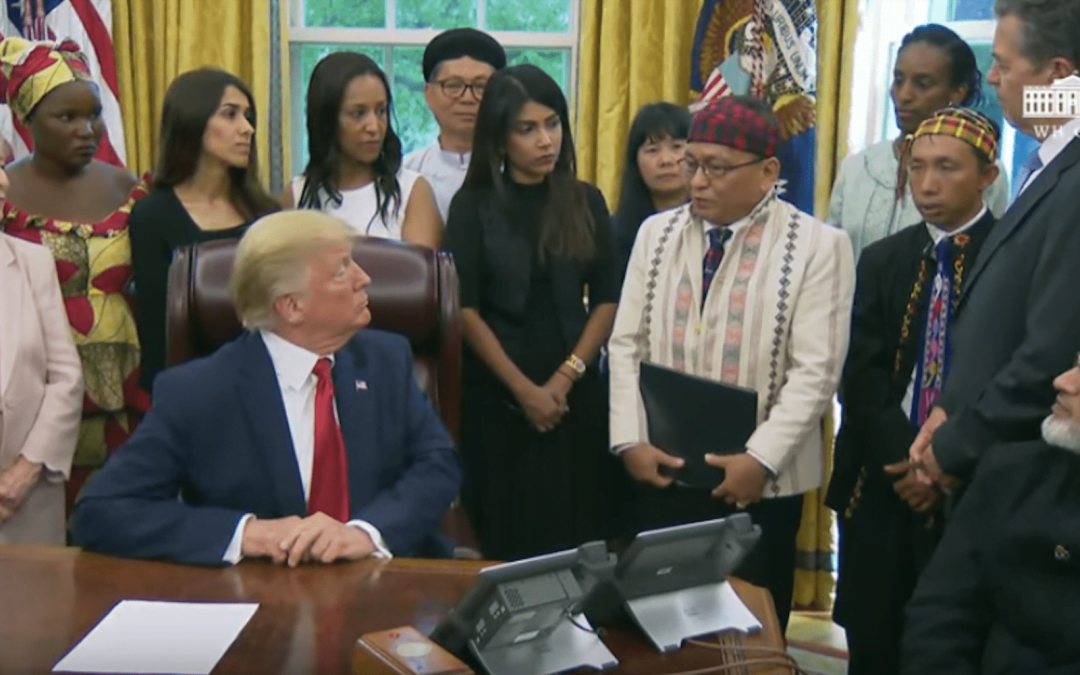Editor’s note: This article has been updated to correct a reference to the news service of the American Baptist Churches U.S.A.
Hkalam Samson, president of the Kachin Baptist Convention of Myanmar, has been accused of “knowingly giving false information” during his trip to the United States for the 2019 Ministerial to Advance Religious Freedom in mid-July.
The defamation suit has been brought by Lt. Col. Than Htike from the Northern Command of the Tatmadaw, Myanmar’s military.
Such suits are common according to a mid-August report in The New York Times, a tactic frequently used by military officials to stifle criticism and seek to influence elections.
Samson, joined by a local pastor named Lanjaw Gam Seng, offered brief remarks about the situation in Myanmar (formerly Burma) as part of the U.S. ministerial focused on religious persecution.
He told President Trump and other U.S. leaders that Christians have “been oppressed and tortured by the Myanmar military government. So … we don’t have a chance … for religious freedom.”
Samson said the U.S. sanctions on Myanmar military leaders, initiated the day prior in response to “gross human rights violations,” were “very helpful.”
He told Frontier Myanmar in a telephone interview on Aug. 28 that it was likely his comments about the sanctions that “made them [the Tatmadaw] angry.”
“The reverend’s testimony to President Trump was … completely truthful and is endorsed by Kachins worldwide,” the World Kachin Congress said in an Aug. 29 statement. “There is no basis at all for criminal charges to be brought against him.”
The Kachin Post reported on Sept. 1 that Samson rejected an offer to drop the suit if he apologized for his comments, stating, “I do not want to trade off the truth for my own individual escape.”
Following Samson’s ministerial remarks – which The New York Times estimates amounted to “less than 60 seconds in the Oval Office” – rumors began circulating of his possible arrest, along with Gam Seng, upon returning to Myanmar.
Baptist leaders began expressing concern to officials in the U.S. government and the United Nations and asked them to intervene, as detailed in mid-August reports by Baptist News Global and The Baptist Standard.
While the news service of the American Baptist Churches U.S.A. reported that Samson and Gam Seng were not arrested upon landing at the Yangon International Airport in mid-August, Samson was soon sued by the military lieutenant colonel.
Following reports of Samson’s scheduled court appearance, ABC-USA issued a declaration of concern on Aug. 30, urging the charges be dropped and asking “the civilian government leaders of Myanmar and the military to support the democratic rights of Dr. Samson and all citizens of Myanmar to the fundamental right of peaceful free speech even when it is critical of the conditions within Myanmar.”
ABC-USA’s General Secretary Lee Spitzer released a pastoral letter on Sept. 4 “asking all American Baptist churches to include a special time of prayer during your worship services on Sunday, September 8, to intercede for Dr. Samson and our Kachin sisters and brothers.”
“If the military insists on pursuing these charges against Dr. Samson or harming another Kachin Baptist leader, Rev. Gam Seng (who we understand has been threatened should he return to his home village), Myanmar will continue to be a pariah among the nations who cherish freedom, democracy and basic human rights,” Spitzer said.
“My hope and prayer is that Lieutenant Colonel Than Htike will drop these erroneous charges against Rev. Hkalam Samson,” said EthicsDaily.com Executive Director Mitch Randall. “Rev. Samson is an important leader in his country, and his ministry is essential to the people he serves. Colonel Htike can become a leader for religious liberty in Myanmar if he chooses freedom for his fellow citizens.”
A Council on Foreign Relations report provides an overview of the governing structure of the Southeast Asian nation, which was governed by Tatmadaw leaders following a 1962 coup until 2011 when it ceded some governing authority back to civilian leaders.
Despite such reforms, the military retains around a quarter of seats in parliament, and the civilian government’s control over the Tatmadaw remains limited.
A mid-August report from the United Nations detailed how the Tatmadaw’s extensive business holdings allow it to carry out “‘brutal operations’ against ethnic groups that constitute ‘serious crimes under international law,’ bypassing civilian oversight and evading accountability.”
Conflict between armed ethnic groups and Myanmar’s military have been frequent and ongoing, leading to concerns about human rights violations, which multiple groups – including Amnesty International, Human Rights Watch and the United Nations – have published reports on this year.


